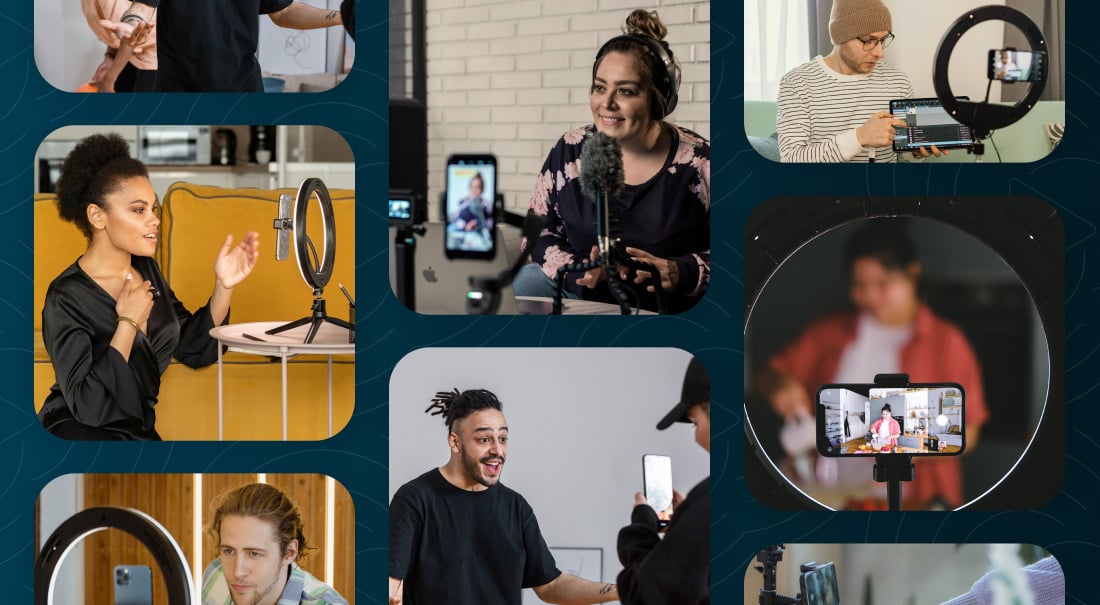Want to make money from videos without relying on going viral or battling social media algorithms? This post is for you.
In this guide, you’ll learn:
-
Six proven ways to earn money from video — and which ones to focus on first
-
How to define a profitable niche and target audience
-
How to build a video marketing funnel to turn views into dollars
-
The key skills needed to maximize your impact and income
Ready?
Step 1. Understand how to earn money from videos
Here are six ways to make money from videos:
-
Advertising
-
Video subscriptions
-
Gated content
-
Brand sponsorships
-
Affiliate marketing
-
Product sales
Let’s take a closer look.
1. Advertising
Platforms like YouTube and TikTok offer a way to earn money by displaying advertisements on your video content.
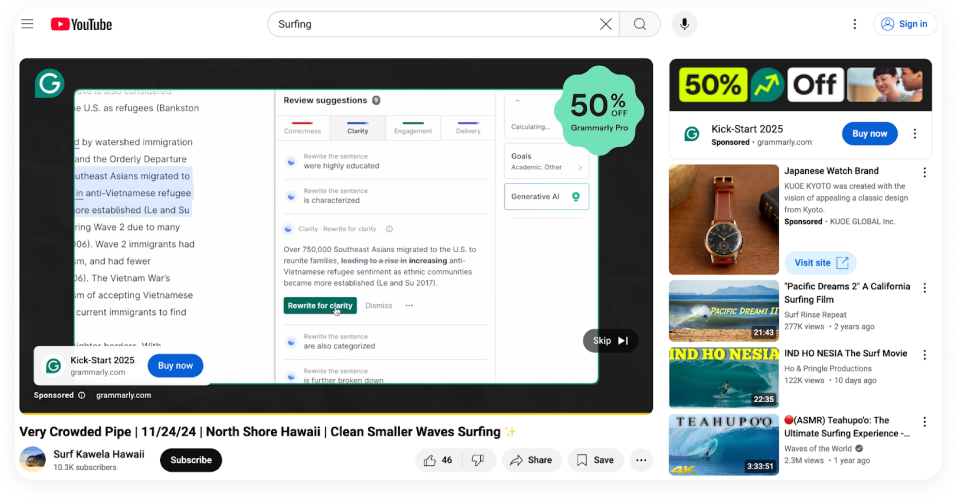
How much money can you make from advertising on YouTube and TikTok?
-
YouTube: $100 to $500 for 100,000 views.
-
TikTok: $2 to $4 for 100,000 views.
It takes a lot of effort to achieve this many views — and even more to keep getting them.
In other words, to make a living from video advertising revenue, you’ll need an established brand, a large following, and a consistent content production machine.
So, if you’re just starting out, it’ll likely take time before advertising revenue becomes a reliable source of income.
Thankfully, there are other ways to get started that are more achievable in the short term.
2. Gated Content
You can use a video platform like Switcher to sell your videos, entire playlists, video courses, or even tickets to live-stream events.
For example, Flow Power Yoga Studio sells gated content and tickets to live online classes.
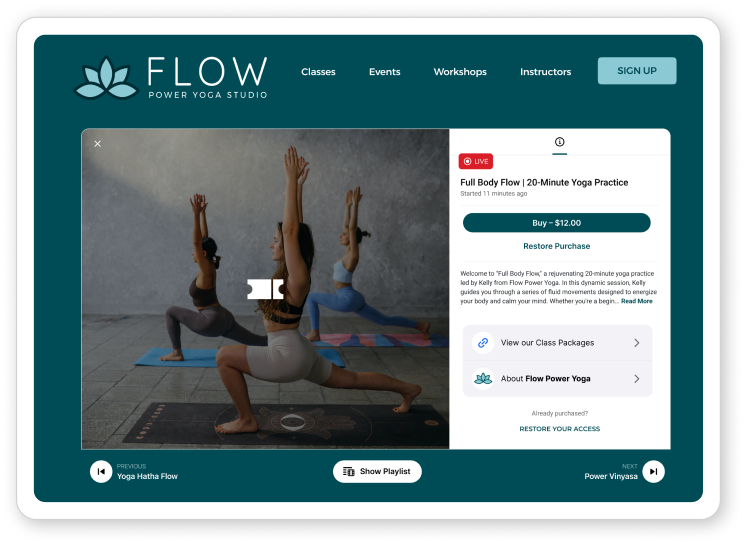
3. Subscriptions
Subscriptions, or video memberships, are your chance to earn a steady income from a small but highly engaged audience that pays to maintain access to your video content.
In the following example, Sourdough Geeks sells a video membership with exclusive content, recipes, and more for a small monthly subscription fee.

Now, $4 per month doesn’t seem like much, right? So, let’s do the math:
-
Views: If you get 1,000,000 people to see your YouTube video, you’ll make $1,000 to $5,000 from advertising as a one-time payment. Then, you’ll need to make another viral video to earn more money.
-
Memberships: If you get 1,000 people to subscribe to your monthly video membership service for just $4, you’ll generate $4,000 in sales every month.
This is why video memberships are so powerful. But beware: YouTube’s Channel Membership feature will take 30% of your money.
So, earn what you deserve with a video monetization platform built for small businesses and creators — with Switcher, you’ll pay just $0.99 per sale.
4. Affiliate marketing
Another way to make money from videos — albeit indirectly — is to promote affiliate products and services to your audience and earn a commission on every sale you make.
All kinds of brands have ambassador programs to help facilitate these partnerships — for example:
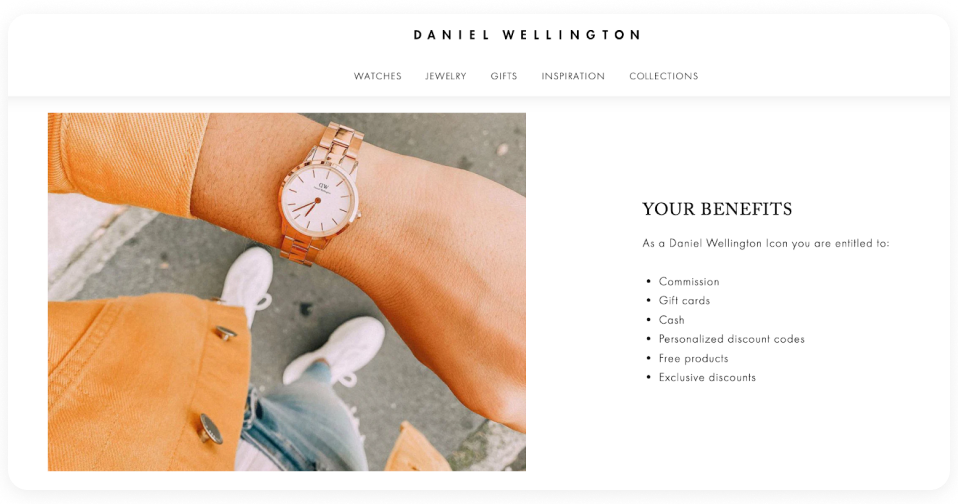
5. Product sales
If you’re interested in diversifying your income streams further, you can earn money by selling physical or digital products directly to your audience.
Here’s a rapid-fire breakdown of how to start selling products with your branding and graphics:
-
Build an online store with an ecommerce platform like Shopify. This is where you’ll display your products and process payments.
-
Add your logo and graphic designs to products you want to sell using a print-on-demand (POD) dropshipping service like Printify or Printful.
-
Promote your products in your video content or sell products on live streams to generate sales.
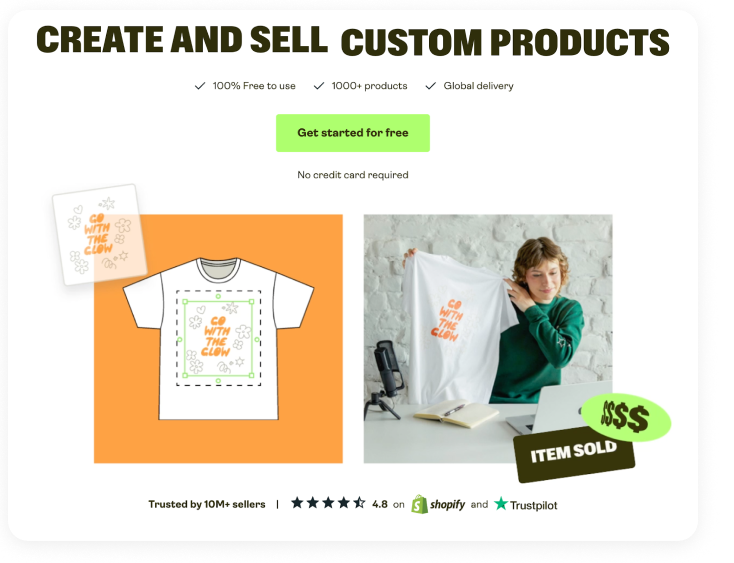
6. Brand partnerships
As your audience grows, some brands will pay you to promote their products or services in your content.
For example, the Instagram influencer Gillian Grace partnered with Pair Eyewear to create promotional posts.
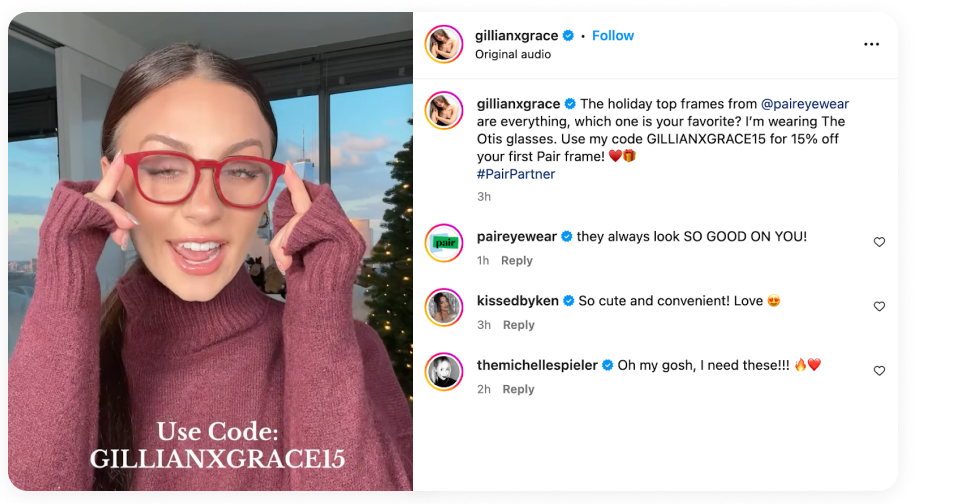
Of course, brand sponsorships are easier to land once you’ve got a large and engaged following.
At that point, you’ll need to create a media kit that contains details about your audience demographics, engagement rates, and more. Then, you’ll need to pitch brands and negotiate deals.
Okay, now we’ve covered how to earn money from video content, how can you become a video content creator and start making money?
Step 2. Define your niche and target market
Before you build your skyscraper, make sure you lay a solid foundation. How?
Choose a specific niche
The more focused you are, the easier it will be to cut through the noise, find your true fans, and make money from videos.
Let’s take another look at Sourdough Geeks:
-
They don’t make videos about cooking — it’s far too broad. I mean, what type of cooking? Peruvian cuisine? Indian curries? Turkish deserts?
-
They don’t make videos about baking, either — it’s still very broad: British cakes? American cookies? French pastries?
-
They make videos about sourdough bread — only.

At first, this might feel counterintuitive — as if narrowing your focus could limit your potential. You might even think, “But what about Amazon? They do everything, and they’re incredibly successful.”
That’s a valid thought, so let’s take a closer look.
Amazon started life in 1995 selling books — just books — on the internet. This was an extremely focused niche in 1995 because hardly anyone bought anything online back then.
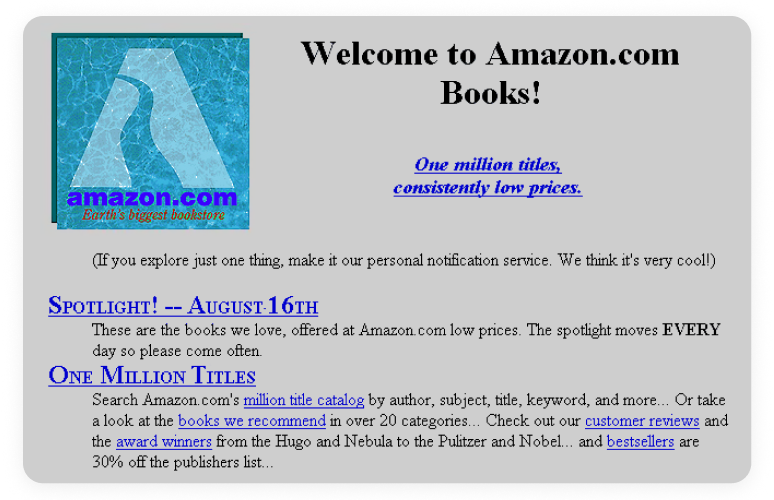
Amazon succeeded by doing one thing incredibly well for a small group. Only then did it slowly expand into the ‘everything store’ we know today.
So, find your fans faster by focusing on a small niche — and lay a strong foundation for growth.
Identify a target market in your niche
Once you’ve chosen your niche, you’ll need to identify your target market — the people you plan to help most (in exchange for money).
For example, the YouTube influencer Roger Wakefield built a huge YouTube following by making plumbing education videos — that’s his niche.

Within the plumbing niche, Roger then defined a target market for his premium pay-to-view content: People looking for specific advice on how to land a high-paying trade job without taking on student debt.

Why is this important?
Well, I watch Roger’s videos when I need plumbing advice — heck, his videos helped me unclog a toilet in Morocco — but I’m not his target market.
Roger will earn a few cents in advertising revenue when I watch one of his videos, but I’m unlikely to purchase a video subscription to help me become a tradesman.
So, choose a niche and identify a target market to focus on. This will allow you to tailor your content to their needs, increasing your impact.
Here’s how to get started:
-
Follow your interests: Pick something you’re genuinely interested in. What could you create content about every day without getting bored?
-
Narrow your focus: The more specific your niche is, the easier it is to capture attention and build an engaged following.
-
Know your people: Who will love your content most? Consider who needs what you’re offering and who will be willing to invest in it.
-
Check the demand: Make sure there’s enough interest to fuel your business. Use social media to see if people are interested in what you plan to create.
-
Spot the gap: Find areas other creators aren’t fully addressing that you can help solve.
-
Understand their struggles: Get clear on your target market’s challenges and create content that solves them.
Step 3. Understand the marketing funnel
Now that you know what type of content you plan to make and who you will make it for, it’s time to learn how to turn your ideas into money.
For this, you need to build a video marketing funnel — here’s how it works:
-
Top of Funnel (TOFU): Build awareness with eye-catching and engaging video content and social posts.
-
Middle of Funnel (MOFU): Deepen relationships with your audience by creating videos that help them achieve something while educating them about your paid offerings.
-
Bottom of the funnel (BOFU): Promote your premium offerings and encourage your audience to pay for them.
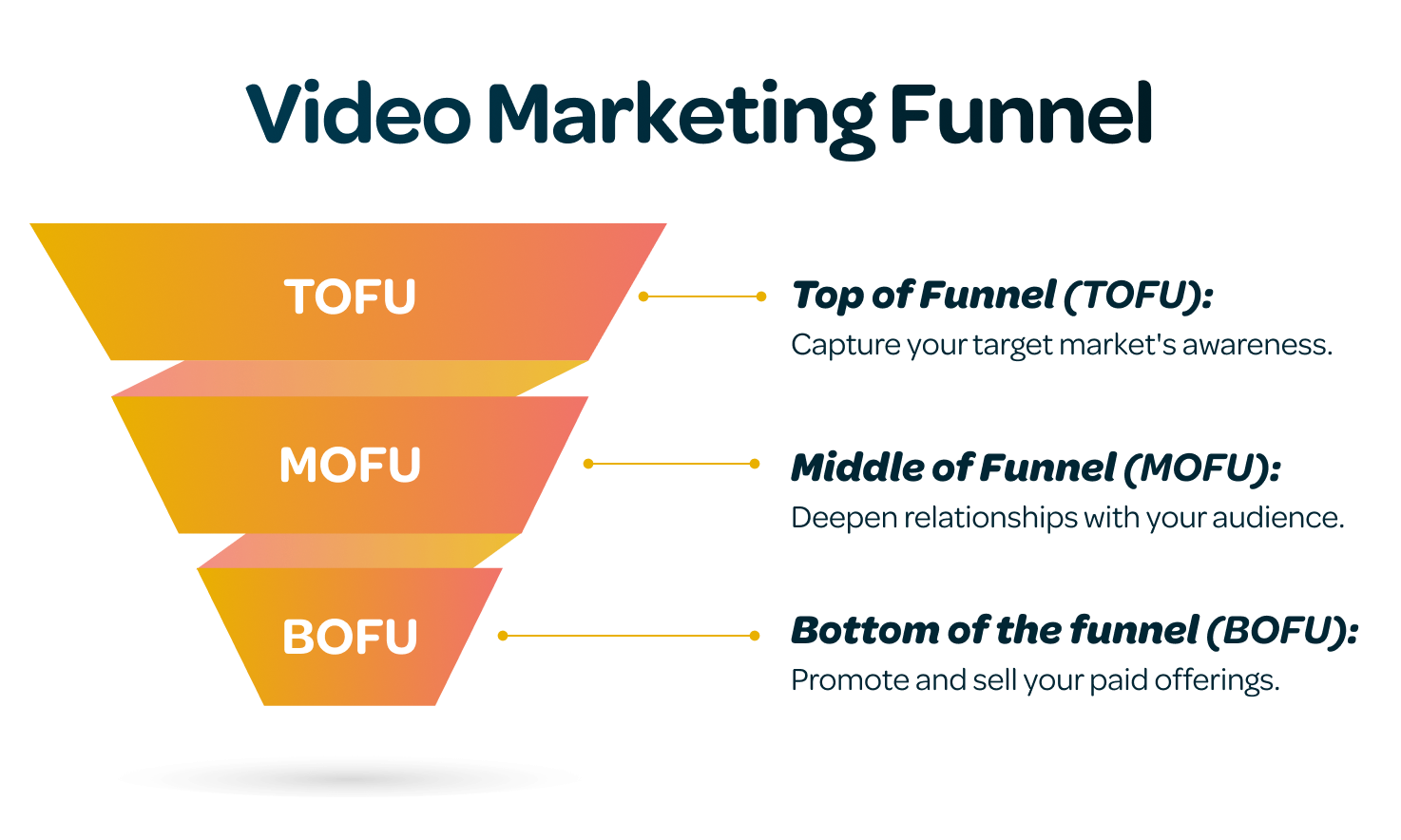
Let’s explore the types of content you can create for each stage to lead people down your funnel.
Top of the Funnel (TOFU): Awareness
TOFU is where first impressions happen. The goal? Hook your audience, provide value, and make them curious about what’s next.
Create content that attracts, entertains, and educates while setting the tone for your brand. Think:
-
Tutorials: Simple how-to guides that solve problems or answer common questions.
-
Video listicles: Quick, snackable content, like “7 Tips to Carve Better When Snowboarding” or “10 Must-Know Live Streaming Trends.”
-
Topical vlogs: Relevant content that showcases your expertise or unique take.
-
Opinion pieces: Bold insights or personal perspectives designed to spark connection and interactions.
-
Entertaining videos: Fun, shareable content that leaves viewers wanting more.
Middle of the Funnel (MOFU): Engagement
By now, your audience is interested but not ready to commit.
MOFU is where you deepen connections by providing more value, building trust, and previewing your premium content. For example:
-
Deep-dive tutorials: Teach your target market how to do something meaningful — and hint at your paid content’s value.
-
Behind-the-scenes: Share your process, amusing mishaps, and lessons learned.
-
Reviews, comparisons, and recommendations: Help your viewers make better decisions, faster, by researching and evaluating the options for them.
-
Q&A sessions and live streams: Connect with your audience directly to deepen relationships and build trust.
Bottom of the Funnel (BOFU): Conversion
Here’s where your audience’s consideration turns into action. Your job is to seal the deal with content like:
-
Trailers and previews: Teasers showing the value of paying for your premium offerings.
-
Free trials or workshops: Let viewers experience your paid offerings risk-free.
-
Customer testimonials and success stories: Showcase social proof to solidify credibility and trust.
Crafting the right content for each stage keeps your audience moving through the marketing funnel.
If you’ve been creating content for a while, take some time to evaluate your existing content and determine which stages of the funnel you’ve covered most and which stages you need to focus on.
If you’re just starting, choose a platform where your target market hangs out most. For example, if you’re targeting millennial search engine marketers, choose LinkedIn, but if you’re targeting Generation Z fitness fanatics, choose TikTok.
Alternatively, use a social media scheduling tool like Buffer, Hootsuite, or Loomly to post your video content across multiple platforms to see which platform performs best.
Step 4. Hone your skills to increase your impact
To increase your impact — and income — work to improve in these key areas:
-
Publish consistently
-
Improve your video content and production
-
Level up your social media marketing
-
Master your chosen social video platform’s tools
Publish content consistently
Whether you use a specialist planning tool or a trusty Google Sheet, create a content calendar to help you:
-
Track and prioritize content ideas
-
Plan your creation process
-
Manage your time
-
Share fresh content regularly
Doing this will help in two main ways:
Consistency is key. So, batch-create ideas and schedule filming, editing, and publishing so you’re never scrambling for content at the last minute.
You can also use social media tools to schedule posts at prime time for maximum engagement. Download our free video content planning toolkit and calendar template to get started.
Your content won't stand out if it’s poorly made. So, before anything else, master the basics of video production.
Whether it's scripting, presenting, filming, lighting, sound, or editing, these skills are essential for keeping your audience engaged.
You’ve spent hours researching, planning, preparing, filming, and editing — don’t let your efforts go to waste!
Also, keep an eye on trends in your niche to find topical content ideas.
Whether you want to capture attention using YouTube, TikTok, or another social video platform, every platform has nuances — and learning how to leverage them can set your content apart.
This data can help you track your progress, experiment with what works, and continually refine your approach.
Once you've got your content flowing, here’s a step-by-step approach to growing your income.
When you’re ready, create premium video content to sell to your audience using a video platform with built-in monetization tools, like Switcher.
Once you hit certain engagement milestones, you can earn money from advertising on social video platforms like YouTube and TikTok.
Focus on what matters most: choosing a profitable niche, building a strong marketing funnel, and honing your skills to create high-quality videos that resonate with your target market.
In the meantime, we’re here to help with everything you need to create and monetize multi-camera videos using the gear you already own. Try Switcher free today and start turning your passion into profit.
